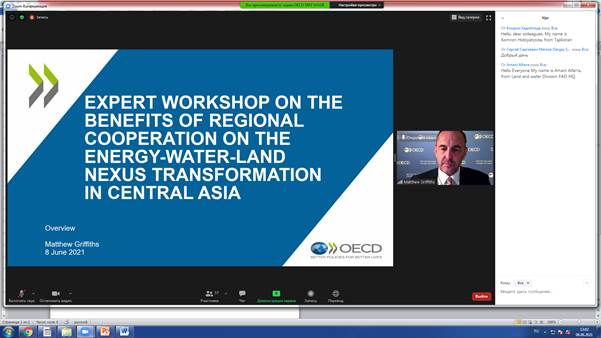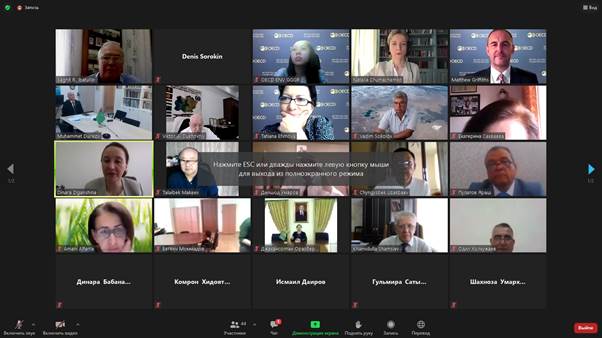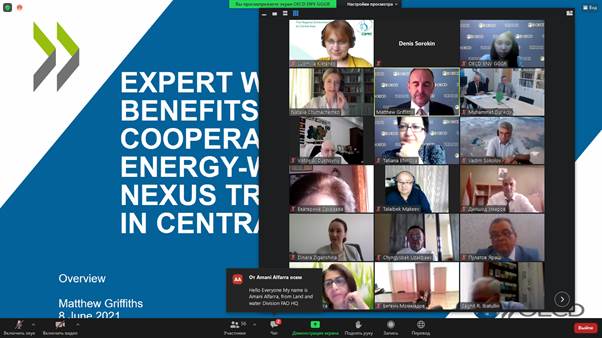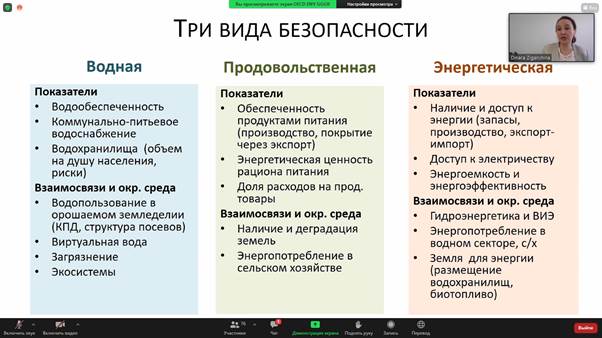SIC ICWC TOOK PART IN THE REGIONAL WORKSHOP “BENEFITS OF REGIONAL COOPERATION ON THE ENERGY-WATER-LAND NEXUS TRANSFORMATION IN CENTRAL ASIA”
The SIC ICWC leadership and leading experts took part in a regional video workshop organized by the Organization for Economic Cooperation and Development (OECD).
The purpose of the event was to discuss opportunities for cooperation and cross-sectoral solutions to promote water, food and energy security in Central Asia and to identify priorities for future actions. Based on the feedback received at the seminar, OECD will prepare a document on the “Benefits of Regional Cooperation on the Energy-Water-Land Nexus Transformation in Central Asia” to be presented at the high-level regional policy dialogue in the second half of 2021.


The workshop was organized in three sessions:
1. Project overview and challenges of cooperation around water, energy and land in Central Asia.
2. Opportunities for enhanced co-operation to address the nexus challenges.
3. Ongoing projects and cooperation on water, energy and food nexus in Central Asia. Presentations from recent and ongoing work in the region.
Opening remarks were made by the Senior Programme Manager of OECD, M. Griffiths.
At the first session representatives of regional organizations Prof. V.A. Dukhovnyi, Director of SIC ICWC, D.R. Ziganshina, his Deputy, A.G. Sorikin, Head of Department, Prof. S.R. Ibatullin, Director of the International Training Center on Safety of Hydrotechnical Constructions, M.H. Durikov, Director of SIC ICSD, H.A. Shamsiev, Director of CDC “Energy”. Further presentations were made by national experts A.D. Ryabtsev (Kazakhstan), Ch.M. Uzakbaev (Kyrgyzstan), Prof. Ya.E. Pulatov (Tajikistan), B. Mamedov (Turkmenistan), V.I. Sokolov (Uzbekistan).
Data collection and analysis of the water, energy, food and environmental security nexus were implemented by the Expert Platform on Water Security, Sustainable Development and Future Studies.

It was noted that achieving each dimension of security requires coordinated and cross-sectoral approaches to the use of water, energy and land resources both within and between countries. Recently, there have been intense debates on the importance of due consideration of multiple relationships between the sectors for achieving water, food and energy security and sustainable development. Understanding the opportunities offered by cross-sectoral and transboundary planning is also vital to ensure a climate-resilient future.

The third session was designed to introduce to the participants the world’s best nexus practices. Presentations were made by A. Lipponen (UNECE), R. Shamayleh (USAID) and L. Kiktenko (CAREC).
The two key findings of the study are as follows.
First: Central Asia, in general, has sufficient resources to meet the needs for water, energy, food and environmental security, but given a number of destabilizing factors (demographic growth, industrial growth and energy needs, climate change and increasing water diversion by Afghanistan) coherent work and cooperation is required among the countries to ensure successful development in the future.
Second: The fact that the Central Asian countries have uneven distribution of arable land, food potential, water resources, fossil fuel reserves, hydropower potential, climate and topography makes it impossible to formulate common measures in terms of energy, water and land nexus for all the countries. It is important to take into account specific characteristics of each country in order to find the most effective solutions for cross-sectoral linkages within the countries and in the region as a whole.
|